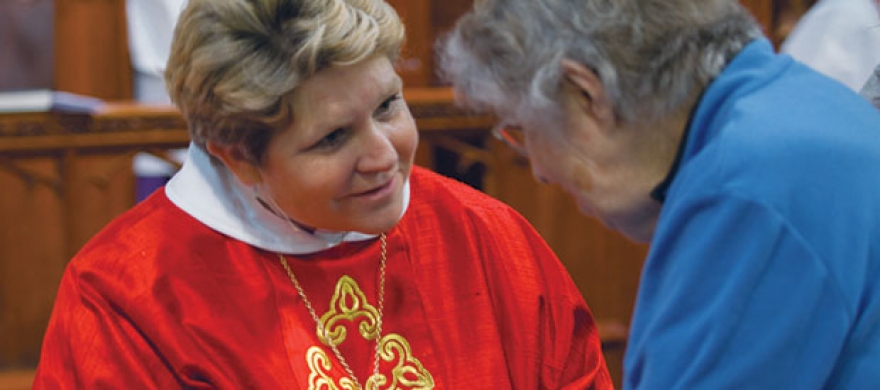Meant for Ministry
A psychologist's lifelong desire to minister to families ignites a higher calling
On December 3, 2016, DeDe Duncan-Probe (MA ’93) became the 11th bishop of the Episcopal Diocese of Central New York, establishing her as the first female bishop of the diocese’s nearly 150-year history. Known professionally as the Right Reverend Doctor, Duncan-Probe now holds a title that was until recent decades held only by men in the Episcopal Church. This record-breaking achievement was especially meaningful for the bishop, as her childhood dream to join the ministry was consistently rejected by those around her.
“I started feeling like my being in ministry was a bad thing because everyone around
me was asking, ‘What are you really going to do with your life? This isn’t what good
girls do,’” she remembers.
Duncan-Probe was particularly interested in ministering to children and families in
her congregation, and although she had devoted much of her time to her church community
in di erent leadership capacities, she knew that an o icial invitation to participate
in ministry was highly unlikely.
“It was confusing because I wanted to serve Jesus and help people,” she continues,
“and they were telling me that I was being difficult.”
As an alternative to tending to her own passion, Duncan-Probe found a similar career
path in providing mental health services and relocated from Texas to California to
pursue a master’s degree in psychology at the Graduate School of Education and Psychology.
Although her new plan seemed like a suitable substitute at first, her part-time employment
as a children and family ministry coordinator at a local church only fueled her desire
to advance God’s kingdom by working in an actual ministry.
“I had spent 28 years listening to people tell me that women can’t be in ministry,
so it took me a while to come to the awareness that that was actually my calling,
and not therapy,” she shares. This epiphany, along with another move from Los Angeles
to San Francisco, introduced Duncan-Probe to other women involved in ministry—namely
one who served as a rector at All Saints’ Episcopal Church in Palo Alto, where she
began to attend.
Feeling both empowered and intrigued seeing a woman taking on a leadership role in
the church, Duncan-Probe approached the rector to inquire about borrowing a book on
the Greek language so she could better understand Scriptures. But instead of a book,
the rector o ered Duncan-Probe the chance to enter into Episcopalian discernment—
an extensive interview, assessment, and research process under the supervision of
a committee—to determine whether a person is truly called by God to serve in the church.
“I argued with her,” Duncan-Probe recalls of the life-changing meeting. “I said, ‘I
can’t go into discernment. I’m a woman. Women don’t do that.’ But through her support,
and the support of that committee, I was able to really open my heart to what God
was calling me to do.”
Sponsored by the Diocese of El Camino Real, which includes Palo Alto congregations,
a committee of eight met with her over the course of one year for intensive testing,
questioning, background checks, psychological evaluations, and the taking of sacred
vows. The next phase was to meet with a committee of 20 people at a diocesan discernment
retreat, where they discussed her family life, spiritual journey, and financial matters.
She then enrolled in a master of divinity program at the General Theological Seminary
in New York City, where she spent the next three years engaging in follow-up sessions
with the Diocese of El Camino Real committee. Upon graduation, she met with the Commission
on Ministry, a group of about 10 people who throughout the discernment process monitored
the seminary and tracked her schoolwork.
“The whole process takes about five years, and anywhere from 40 to 100 people at any
point are engaged in discerning with you whether there is a call to ministry,” Duncan-Probe
reveals.
Once she was approved by the commission and the bishop, she began serving in the church,
partaking in the vows she had promised to fulfill.
Since becoming ordained, Duncan- Probe’s goal has not necessarily been to gain crowds
of new Sunday visitors, but rather to increase the number of people who are touched
by the ministry and inspired by the message.
Believing that the Gospel is as relevant now as ever, she encourages her church to
freely share God’s love with the world by applying traditional Christian principles
to a contemporary lifestyle.
As Duncan-Probe explains, “People want to do something that has meaning and value—they
don’t just want to gather for a social club. So how the church lives out its mission
has to change.”
One way to show biblical compassion to a post-modern society is to bestow on everyone
the same level of respect and kindness that we would Jesus.
“Especially during this time of confusion over what the nation should do about immigrants
and refugees, we must recognize that Jesus was an immigrant and a refugee,” she says.
“My hope for the diocese in this time is to stir up—just as I vowed to do—a sense
of calling to be like Jesus in real and meaningful ways.”
